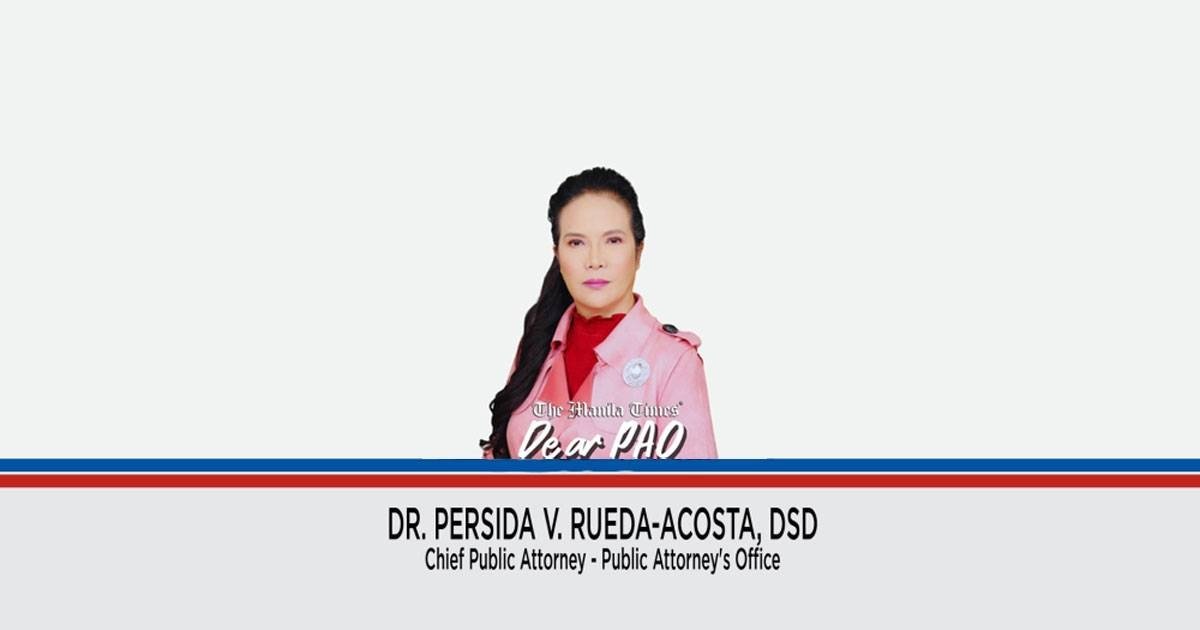Dear PAO,
My grandparents were legally married in 1975, but they were separated-in-fact. Their children, which include my mom, are running after a land which was sold alone by my grandfather to Jose. They are claiming that such sale is invalid because my grandmother did not give her consent to the sale. My Uncle Bo told his siblings that such sale is only voidable and not void. They want to recover the land.
Terry
Dear Terry,

Your Uncle Bo might be trying to apply the provision of Article 173 of the New Civil Code of the Philippines because your grandparents were married before the effectivity of the Family Code of the Philippines on Aug. 3, 1988. Pursuant to the said provision of the law:
“The wife may, during the marriage, and within ten years from the transaction questioned, ask the courts for the annulment of any contract of the husband entered into without her consent, when such consent is required, or any act or contract of the husband which tends to defraud her or impair her interest in the conjugal partnership property. Should the wife fail to exercise this right, she or her heirs, after the dissolution of the marriage, may demand the value of property fraudulently alienated by the husband.”
Please note, however, that the prevailing law now is the Family Code of the Philippines, and under Article 96, in relation to Article 124, of said law:
“The administration and enjoyment of the community property/conjugal partnership shall belong to both spouses jointly. In case of disagreement, the husband’s decision shall prevail, subject to recourse to the court by the wife for proper remedy, which must be availed of within five years from the date of the contract implementing such decision.
“In the event that one spouse is incapacitated or otherwise unable to participate in the administration of the common properties, the other spouse may assume sole powers of administration. These powers do not include disposition or encumbrance without authority of the court or the written consent of the other spouse. In the absence of such authority or consent, the disposition or encumbrance shall be void. However, the transaction shall be construed as a continuing offer on the part of the consenting spouse and the third person, and may be perfected as a binding contract upon the acceptance by the other spouse or authorization by the court before the offer is withdrawn by either or both offerors.”
Thus, the New Civil Code of the Philippines declares the disposition of property belonging to the conjugal properties without the consent of the other as a voidable contract. But at present, such disposition is void under the Family Code of the Philippines. This finds support in the case of Spouse Cueno vs. Spouses Bautista, et al., GR 246445, March 2, 2021, where the Supreme Court, speaking through Associate Justice Alfredo Benjamin Caguioa, stated that:
“Finally, it bears reiterating that unlike Articles 166 and 173 of the Civil Code, the Family Code now expressly declares that alienations or encumbrances of community or conjugal property without the consent of the other spouse are null and void. xxx
“In Guiang v. Court of Appeals (Guiang), the Court affirmed the observation of the RTC that the remedies afforded by Article 173 were not carried over to the Family Code, which thus signified the change in status of such transactions from the Civil Code to the Family Code. The Court agrees with the rationale in Guiang that the evident revisions under the Family Code are deliberate and confirm the legislative intent to change the status of such transactions from voidable under Civil Code to void under the Family Code. However, the Court notes the special nature of these void transactions even under the Family Code, which can become binding contracts upon the acceptance by the other spouse or authorization by the court before the continuing offers are withdrawn by either or both spouses.”
Applying the afore-cited decision in your situation, it is important to know the exact date when your grandfather actually sold the property to Jose because this was not mentioned in the given set of facts. Assuming the sale happened before the effectivity of the Family Code of the Philippines, which is Aug. 3, 1988, then your Uncle Bo’s claim that the contract of sale is voidable is correct. But, if the sale happened on or after Aug. 3, 1988, such kind of sale is now expressly declared as void under Articles 96 and 124 of the Family Code of the Philippines.
We hope that we were able to answer your queries. This advice is based solely on the facts you have narrated and our appreciation of the same. Our opinion may vary when other facts are changed or elaborated on.
Editor’s note: Dear PAO is a daily column of the Public Attorney’s Office. Questions for Chief Acosta may be sent to [email protected]










